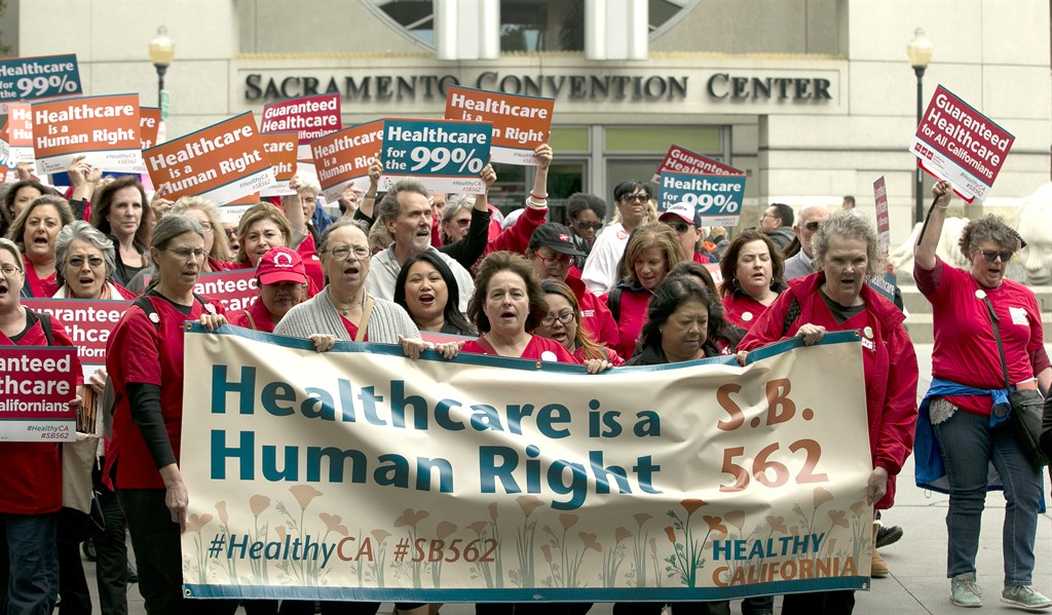The California state senate has passed a bill creating a single-payer health care system to the full legisature, only without an important component — any idea how to pay for it. An analysis by the chamber determined that such a system would cost more than twice the annual budget for the state, and even with a full guarantee of current federal funding, the shortfall would exceed the entire $180 billion budget for FY2018. Where will California get the money? Democrats apparently don’t care:
A California Senate committee tasked with reviewing bills that spend state money passed a $400 billion universal health care proposal Thursday with no funding plan.
Sen. Ricardo Lara, D-Bell Gardens, introduced SB 562, a sweeping overhaul of the state’s health insurance market. He’s also the chair of Senate Appropriations. The committee passed the bill with a 5-2 vote during a fast-paced suspense file hearing, clearing the way for it to be taken up on the Senate floor next week.
The vote came days after the committee revealed the Legislature’s first cost assessment of the bill, which turns out to be more than the entire state budget for the year beginning July 1.
Lara has yet to reveal a detailed plan about how the state would come up with the money to provide health care to the nearly 40 million people living in California. Opponents argued that the funding issue should have been addressed before the committee voted on the measure.
Details, details! Who cares about how one pays for an entitlement program? The point is to pass it, and let your great-granchildren figure it out. In this case, however, the problem is so large that it’s impossible to do without the funding in place first, because of the need to pay providers for goods and services. California hardly has an extra $200 billion laying around, and even if it did, it would need to shore up its collapsing pension system first. The state is also on the hook for a $100 billion high-speed rail system whose funding is still unclear. Democrats don’t have much idea about how to pay for their current priorities, let alone their seizure of the health-care sector.
Why would Democrats put themselves at risk by passing such a massive seizure of a sector of the economy without planning for the funding and the costs? Because that’s what their progressive base urges them to do. Here’s RoseAnn DeMoro, executive director of the California Nurses Association, offering a foul-mouthed tirade that ridiculed those who are waiting for a fiscal analysis at a rally for SB562. DeMoro also called support for universal access “chicken-s*** talk for I’m never going to say ‘single payer health care’.” With arguments like this, who needs facts and data, eh (not safe for work)?
The reason why Democrats don’t have a funding plan for single payer is because all of the options would be political catastrophes, as I noted in my column for The Week. As Colorado voters discovered early enough to matter, the options would get even worse after implementation as costs escalated even further from revenues:
But wait! Can’t they just use the money California employers pay now for health care by transferring those funds to the state in taxes? Theoretically yes — but it’s still not enough. According to the Bee‘s report of the Senate analysis, “Employers currently spend between $100 billion to $150 billion per year, which could be available to help offset total costs. To get that cash into the California system, the state would have to impose new taxes to seize those funds — and even then, California’s new health-care system would still come up short by between $50 billion to $100 billion every year.” …
The solutions for this fiscal meltdown in a single-payer system, CHI noted, were all unpleasant. One option would be to cut benefits of the universal coverage, and hiking co-pays to provide disincentives for using health care. That would in some cases “reduce the level of insurance below what [Coloradans] have today,” the study noted. The state could raise taxes for the health-care system as deficits increased, which would amount to ironic premium hikes from a system designed to be a response to premium hikes from insurers. Another option: Reduce the payments provided to doctors, clinics, and hospitals for their services, which would almost certainly drive providers to either reduce their access or leave the state for greener pastures.
Those are the only options available in closed systems. Our experiences with other state-run single-payer systems in the U.S. only reinforce the conclusions reached by CHI. Medicare and Medicaid have attempted to restrict provider payments while expanding their enrollments, and as a result providers have greatly reduced their access to new patients from both systems. The Veterans Administration has wait times for its clinics that stretch out so long as to have resulted in patient deaths, along with rampant corruption to hide failures and protect the bureaucrats at the expense of the patients. The Indian Health Service, which provides care to those on reservations, has such crises of funding that Native Americans stuck in the system joke about not getting sick after June.
That’s the reason why Lara and his allies want to pass this bill in a rush. They don’t want to account for the accounting, which will expose this as a massive and inefficient seizure of open markets that will require an avalanche of taxes, mandates, and rationing. “Don’t wait,” their allies urge while ridiculing fiscal responsibility. There’s a big, big lesson in DeMoro’s profane inanities, if Californians are willing to learn it.







Join the conversation as a VIP Member